Carmakers in Europe are not afraid of collaborating with logistics partners to decarbonise inbound and outbound logistics. At this year’s ECG conference in Hamburg, Germany, speakers from JLR, Mercedes-Benz and Renault outlined what they were doing to secure more sustainable deliveries.
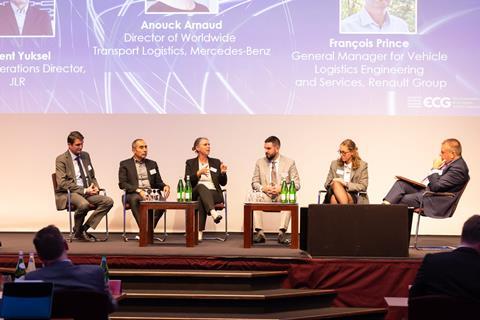
At this year’s annual conference for the Association of European Vehicle Logistics (ECG), carmakers and their logistics providers talked about the requirements for greater collaboration in making the inbound and outbound logistics supporting vehicle production more sustainable.
François Prince, general manager for vehicle logistics engineering and services at Renault Group, talked about the electric trucks being used for inbound parts deliveries to the carmaker’s plant in northern France. Though not named, Renault is using seven etrucks to move parts to its Douai plant in northern France which makes the Megane etech, Scenic etech and R5 EVs.
Renault is working with a local transport company for the trial deliveries and Prince said the etrucks use a drop and swap strategy, where the truck delivers a trailer and leaves it to be unloaded while returning for the next pick up from the local supplier, reducing lead times.
Automotive Logistics’ European Market Report 2024-2034 underscores this push toward localising EV supply chains to reduce emissions and optimise logistics for EV production. According to the report, the increasing EV demand and move toward battery localisation are expected to radically reshape logistics for OEMs like Renault, with more localised and decarbonised supply chains becoming essential.
Prince said collaboration with the transport provider was key in making the trial work, as were government subsidies to make the cost of the etrucks manageable and having the necessary infrastructure to charge them. Renault Group aims to continue the etruck trials because parts deliveries to the EV plant using them is part of the carmaker’s efforts to establish a sustainable ecosystem. The carmaker is also looking into the use of etrucks for finished vehicle shipments out of the plant.
Mercedes-Benz is also collaborating with its transport providers on the use of etrucks for inbound and the outbound transport, according to Anouck Arnaud, director of worldwide transport logistics, at Mercedes-Benz. She agreed that the deployment of etrucks required subsidies to help with pricing. It also meant establishing the right supporting charging infrastructure.
According to Arnaud, Mercedes-Benz is building a new consolidation centre near one of its plants in Germany. That is likely to be the International Consolidation Center in Bishweier, near the Mercedes-Benz Ratstatt assembly plant which makes the A- and B-Class, as well as the compact SUV GLA and the all-electric Mercedes-Benz EQA. Arnaud said etrucks that bring parts into the centre will be able to recharge as they unload.
The carmaker is also looking at collaboration with the maritime shipping industry for inbound parts and finished vehicle logistics to get “the whole lane carbon free”. Arnaud said Mercedes-Benz was already doing well with carbon-free shipments from plant to port as well as exploring sustainable ocean shipments.
Small steps to sustainability
Last year JLR said it that within 12 months it planned to shift from diesel-powered trucks for inbound transport toward alternative fuels and, according to Levent Yuksel, freight operations director at the carmaker, that is being achieved. He admitted that existing leases with transport equipment meant that did not mean the use of etrucks yet, but JLR is collaborating with transport providers on moving inbound parts with vehicles fuelled with hydrotreated vegetable oil (HVO), which is sourced and purchased responsibly.
“We did what we set out to do and within the 12 months we have completely decarbonised the emissions in our core grid by 85%,” said Yuksel.
The report from Automotive Logistics discusses this trend, highlighting that many OEMs are now experimenting with sustainable fuel alternatives, like HVO, to decarbonise fleets and reduce emissions across inbound logistics. However, it points out that finished vehicle logistics still faces challenges due to capacity constraints and limited ro-ro availability, which is reflected in JLR’s inbound successes versus outbound difficulties.
Yuksel went onto say that it is easier to make inbound transport sustainable because JLR has fewer operators and more dedicated equipment, giving it more control on what can be achieved. That is not the same for the finished vehicle sector where transport equipment is less likely to be dedicated, meaning that agreements on sustainable alternatives are more difficult. JLR is not investing in its own fleet of car carriers meaning collaboration is a must.
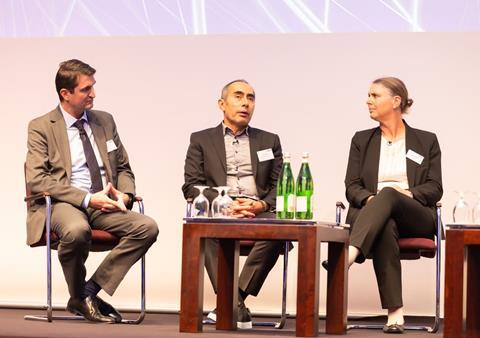
Yuksel highlighted JLR’s collaboration with a road haulage firm that has invested in four tractor units running on bio-CNG. While that equipment has lost a load factor of one vehicle because of the onboard CNG tank it is a step in the right direction for decarbonised finished vehicle logistics.
Yuksel also pointed to one of its maritime shipping partners which is using biofuels on ro-ro vessels travelling between Zeebrugge and Norway. That is another step on the journey to zero emissions, which while not achievable immediately, does help JLR toward its goal of carbon neutrality by 2039 and more immediate objectives of reducing emissions by 40% by 2030. “It is a journey and we are taking small but robust to get there,” said Yuksel.
Speaking for the transport providers, Johannes Alexander Hödlmayr, CEO of the Hödlmayr International, provided one example of collaboration in the movement of high and heavy equipment. Hödlmayr is working with truckmaker Scania and the data emissions-tracking company Elain (originally a Scania start-up). The collaboration provides accurate CO2 insights for Hödlmayr in its movement of Scania equipment.
The Elain Advanced emissions tracking tool integrates CO2 insights for the transport provider for haulage operations in Europe and Turkey across a fleet of 120 trucks.
“Collaboration is the way to go as sustainable logistics challenges get more complex,” said Hödlmayr.
The importance of digital transparency and data-driven solutions in modern logistics was highlighted in Automotive Logistics’ European Market Report, as tracking and emissions data become central to sustainable operations. Hödlmayr’s example reflects a broader industry trend towards emissions monitoring and transparent data reporting, essential for future-proofing logistics as both an environmental and business imperative.
Forums for the future
There are a number of forums in Europe that help overcome individual company barriers to collaboration, according to the speakers. The ECG itself helps to achieve this with its members and outside organisations. Just last month the ECG announced it is working in partnership with Smart Freight Centre (SFC) – non-profit organisation dedicated to sustainable freight and logistics – to accelerate the decarbonisation of the vehicle logistics industry across Europe. That initiative involves the implementation and promotion of best practices in carbon measurement, management and reduction. It follows last year’s collaboration between ECG and SFC on a methodology to account for greenhouse gas (GHG) emissions from ro-ro operations.
Mike Sturgeon, outgoing executive director at the ECG, said standardised digital messaging would never have happened without the participation of the Germany Association of the Automotive Industry (VDA). “And the emissions methodology, which brought not just VDA but others together as well, would have been very much harder, I think, if there hadn’t been some sort of forum,” he said.
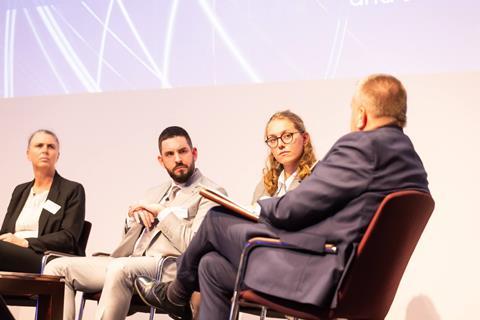
Arnaud also pointed to the VDA where Mercedes-Benz has a lot of discussions on collaborative logistics topics. She said that one of the barriers to collaboration hard work required because of the huge complexity involved. “It’s about working out how to master this complexity and understand where we are getting better but also where are we slowing down,” she said.
One instance, Arnaud referenced was collaboration on operations, which requires consistent and available real-time data for prioritisation. “It’s difficult enough in one company but with different companies it makes it more complicated,” she said. “What we need to do, including with the ECG, is focus on the standards.”
That includes for decarbonisation and agreeing on a standard to measure the savings. “The same goes for digitalisation and track and trace, for example,” she said. “It only works if everyone uses it. There are standards on data formatting and for this collaboration is the most important.”
Renault’s Prince also pointed to standardisation and the benefits the ECG as a supporting industry association can bring. “We are not talking about pricing or things that we should clearly not discuss but when I go to the ECG for quality and safety standards I am impressed,” he said. “This is collaborative and involves transport companies. We need to tackle legislation, standards and quality topics and come to an agreement and then tackle them together.”
Yuksel agreed that pricing was dangerous territory but on areas such as sustainability and quality, partners had the expertise and capacity to keep the conversation going, and he pointed to the support from the Green Cost Calculator also discussed at the ECG conference. “Those kind of things are open and as long as everybody acts responsibly, and we don’t go to the red territory, we can start from there.”
Cecilie Brandt Bidstrup, director and head of products at DFDS, said what the industry needed was frontrunners who could take a leap of faith. Bidstrup said that burden to decarbonising logistics was the lip service paid by companies who professed willingness to invest in green solutions but never actually did.
“What we have experienced at DFDS is that when someone takes a leap of faith and is a frontrunner, others follow, and I think we are sometimes missing a few of those frontrunners who are willing to take a leap of faith and make that investment,” she said.
Bidstrup said that there is enjoyment to be had sitting down with competitors in workshop mode and talking about sustainability issues. “Creating those forums to sit around the table and discuss things with competitors I think could be a way forward,” she said.
Supporting Bidstrup’s point, Automotive Logistics’ European Market Report 2024-2034 notes that sustainability in logistics requires early adoption and investments from industry leaders who are willing to prioritise green logistics over immediate cost savings.
For a deeper understanding of the trends shaping European automotive logistics, including detailed insights on digitalisation, sustainability and collaborative solutions, download the Europe Automotive Logistics Market Report 2024-2034. This comprehensive report offers vital analysis for OEMs, logistics providers and all industry stakeholders committed to building a cleaner, more resilient future in automotive transport.
Download the full report now to drive your sustainability strategy forward

























![Global[1]](https://d3n5uof8vony13.cloudfront.net/Pictures/web/a/d/s/global1_726550.svgz)





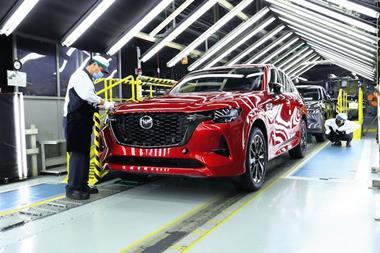
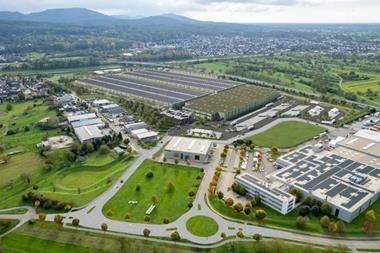







No comments yet